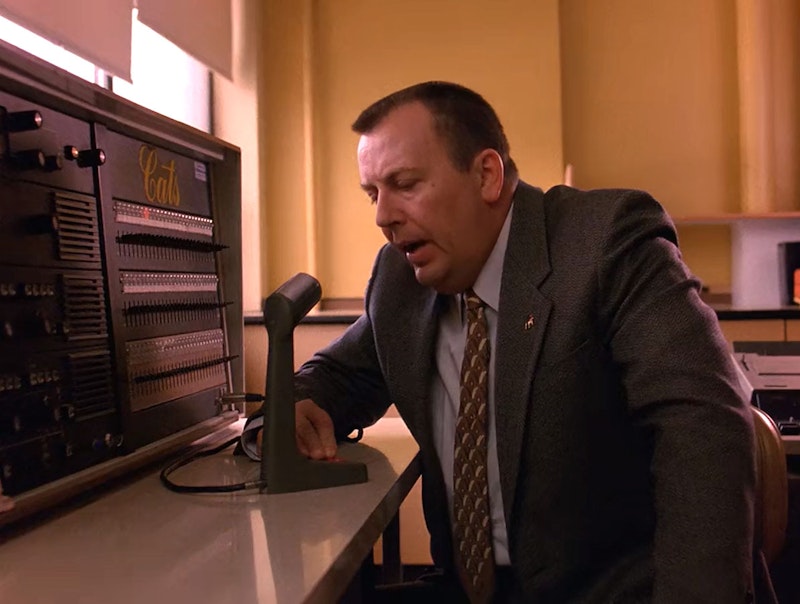There’s a scene in the Twin Peaks pilot that I rarely see discussed: George Wolchezk, principal of Twin Peaks High School, addresses the student body and, tearfully, announces that their classmate Laura Palmer has died.
The discovery of Laura’s body is at the very beginning of the pilot. Lynch and series co-creator Mark Frost show how word of the popular high schooler’s death travels from the shore that holds her plastic-wrapped corpse to the town of Twin Peaks and, finally, to those who knew and loved Laura. Lynch and Frost structure the pilot so that the discovery of the body takes on greater significance and emotional resonance as it goes on and we learn more about the victim. Laura wasn’t just a young girl—she was homecoming queen. She was Donna Hayward’s best friend, the girlfriend Bobby Briggs took for granted, the secret paramour of James Hurley. She was loved. She mattered.
The spiritual devastation of Twin Peaks in the wake of Laura’s senseless murder—and the gradual reveal that she was the victim of violent sexual abuse that the town largely ignored—are central to the series. But we don’t get there without Principal Wolchezk’s announcement and the scenes that immediately precede it: Donna’s ice-cold panic as she realizes her friend is absent from school; the sheriff’s quiet attempts to inform the school’s staff; an anonymous girl running past a classroom window screaming in horror.
Sheriff Truman charges Wolchezk (played by Troy Evans) with breaking the news. “Now?” the principal asks. “Now’s the time.” In the next scene, Wolchezk, an unremarkable middle-aged man with a flat crewcut and a drab gray suit, sits before the school’s PA system
“May I have your attention, please? This is Principal Wolchezk. I am deeply saddened to have to tell you that, early this morning, your classmate Laura was found dead. This is a terrible moment for all of us. For all of us who knew her. Her friends, her family.”
Wolchezk’s voice echoes through empty halls and full classrooms. Donna sobs, while James can barely keep it together
“It is very important that we all try to help each other through this difficult time. The police have asked me to ask each of you, if you have any information about Laura’s activities after school yesterday, or yesterday evening, to please come forward. I am dismissing all classes for the day. But before we leave, I would like to ask each of you to join me in a moment of silence for Laura and her dear memory.”
By the end of his announcement, Wolchezk bursts into tears. “Oh god,” he cries in his small, empty office.
In an interview with the AV Club’s Will Harris, Evans revealed that scene was captured in one take. What was supposed to be a dry rehearsal before the real first take transformed, in the moment, into a profoundly emotional performance.
“I start just as I planned... And I started just saying it, and as I’m trying to do that and keep it as clean as I can, I get maybe two or three sentences into it… and the horror of what I was saying just started to overwhelm me, y’know? This young girl was coming to school, and somebody killed her! And I’m trying to hold it back, and I don’t want to cry, but I get to the end, and the thing with the switches, that was completely instinctual. And David Lynch said, ‘Cut’ I was waiting for this reaction and he said, ‘Are you happy with that?’ I thought he meant, like, with the general approach. I said, ‘Well, sure, if you are.’ He said, ‘Okay, moving on!’ That was it. He shot the rehearsal, he liked it, he kept it.”
In the larger story of Twin Peaks, this is a small scene. But it illustrates what makes the show so powerful and Lynch’s work as a whole compelling: a heartbreaking howl of grief shared between the adults and children of a community; a fleeting yet frozen moment of horror; despair that briefly pierces the veil between character and performer. At the end of the scene, the camera dollies into a close-up of a trophy case with a framed photo of Laura as homecoming queen; once a human being, now a memory, fading away.
—Max G. Robinson is a Baltimore-based writer and film critic. He’s currently working on a book about Nobuhiko Obayashi’s House.

